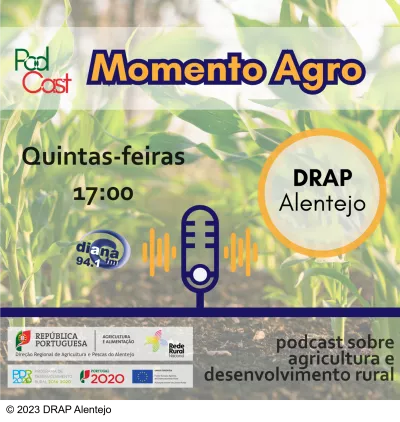General information
RDP Priority
- P1. Knowledge transfer and innovation
RDP Focus Area
- 1C: Lifelong learning & vocational training
RDP Measure
- M20: Technical assistance
Beneficiary type
- Local / regional authority
Summary
The Regional Direction of Agriculture and Fisheries of Alentejo (DRAP Alentejo) prepared a 24-episode podcast series which was broadcast by radio in addition to being available for download. Each episode, which includes an interview, invites discussion and knowledge sharing around a theme related to agriculture and rural development. The aim of this digitalisation project was to disseminate information and knowledge in the Alentejo region through multiple channels (i.e. including digital streaming and download alongside traditional means) in order to improve access and grow audiences.
Results
- The ‘Momento Agro’ series of podcast has brought agriculture and rural development issues closer to the citizens of Alentejo.

Promoter
Direção Regional de Agricultura e Pescas do Alentejo
Funding
RDP support: 3 223 (EUR)
Ressourcen
Documents
Context
The Regional Direction of Agriculture and Fisheries of Alentejo (DRAP Alentejo) operates under the Portuguese Ministry of Agriculture and Food. Its mission is to design and implement policies related to agriculture, forestry, rural development and fisheries. An important aspect of its role is to share information and best practices relating to agriculture and rural development amongst sector stakeholders.
These stakeholders - citizens and rural actors - are becoming more and more aware of new technologies and communication alternatives. Thus, DRAP Alentejo decided to create a series of podcasts that can be downloaded and listened to on any device; giving their audience greater freedom about how and when they engage with the content that DRAP Alentejo shares.
Objectives
The aim of this digitalisation project was to improve the way DRAP Alentejo disseminates information and knowledge concerning agriculture and rural development in the region, by strengthening its digital presence and attracting new audiences.
Activities
Each of the 24 weekly podcast episodes has a different theme and a different guest; selected according to the theme that is to be addressed. The themes have included:
- Agriculture, Fisheries and Rural Development and the importance of services in the territory
- New organisational forms adjusted to a green and circular economy
- Family agriculture and its importance in the development of the territories
- Agrotourism challenges
- Women in agriculture
- Young farmers
- Short agrifood circuits/supply-chains
- Valorisation of the Mediterranean diet
- Honey and the montado
- Sustainable development; livestock production and climate change
- New strategies of production diversification
- Vegetable and flower production - a different perspective on agriculture
- Cereals - a matter of food sovereignty
- Information technology at the service of agriculture
- Qualified products - DOP IGP ETG
- Local Action Groups and their importance
- Education and food safety and health
- Vocational training and its importance to the agricultural sector
- Plant health
- Digital and new technologies in agriculture
- Innovation in the vineyard and its products
- Innovation in meat production chain – the Ethical Meat Project
- The olive grove and Alentejo
- Alentejo Coastal Region: water management and intensive production
Main results
- The ‘Momento Agro’ podcast series has brought agriculture and rural development issues closer to the citizens of Alentejo and enabled informed debates among farmers and other rural actors concerning the themes it explores.
Key lessons
- This project has alerted the DRAP Alentejo to the fact that there are still many themes that need to be discussed in greater depth.
- Implementing such projects can create considerable added value as the various themes and discussions allow for different perspectives and novel approaches to be explored and showcased, thus stimulating the sharing of knowledge.
José Godinho Calado

